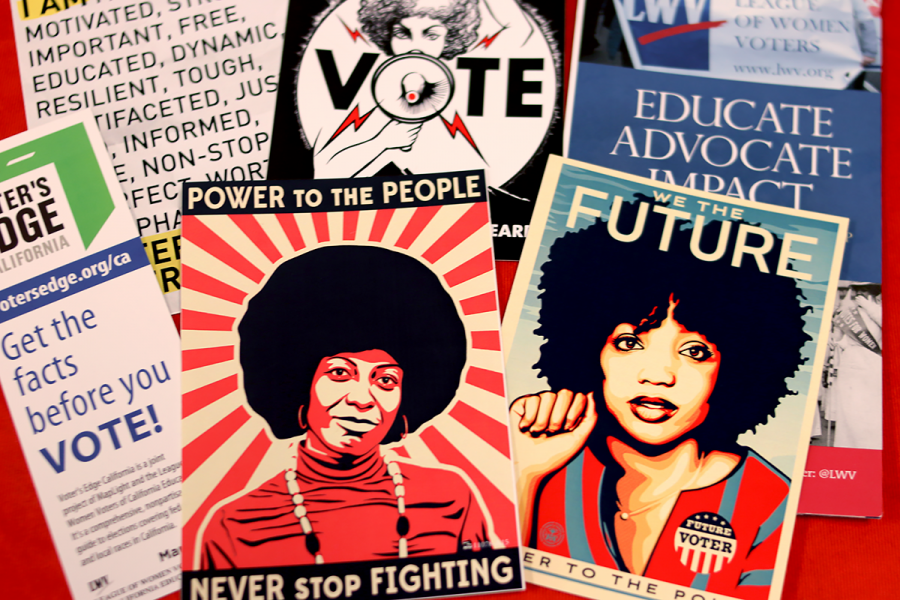Women’s History Month: California laws that advance racial and gender equality
March 12, 2020
This March, women all around the world are celebrating Women’s history month commemorates the contribution and the influence of women throughout history, culture, and society. The theme for this year’s 2020 WHM is “Valiant Women of the Vote,” which looks to honor the 100th anniversary of the 19th amendment which granted women the right to vote while raising awareness about the importance of political advocacy to ensure equality for all.
As of 2020, California has expanded its laws pertaining to healthcare, representation on the board of directors, equal prize money, and dress code & grooming policies. These set of laws and ratifications ensure women are treated equally in the workplace and health facilities.
In Oct. 2019, California became the first state to take action on maternity mortality bypassing the “California Dignity in Pregnancy and Childbirth Act,” which requires perinatal healthcare providers to take implicit bias tests and training to prevent maternity-related deaths amongst Black women. The bill also requires all health clinics and facilities in California to publicize data and information on pregnancy-related deaths.
Dr. Sayida Peprah, a licensed clinical psychologist and a trained doula shared her thoughts and concerns on how the bill will be put into action.
“I have been incorporating implicit bias training in my diversity training for years, and in the past two years specifically I focused on implicit bias for maternal health groups,” Peprah said in an interview. “So I think the realization of this issue is important, but I also think people’s readiness is going to determine how effective it’s going to be. It can’t be a one-stop-shop, it has to be a continuous process and experience.”
In Sept. 2018, California passed Senate Bill 826 or “Women on Board,” which mandates all publicly held companies to have female representation on the board of directors. Companies had a deadline until December 31, 2019, to comply with the bill. A recent report published by California Secretary of State on SB 826, indicates that out of 635 companies,625 complied with the board gender diversity mandate.
Ellen Kullman, an executive board member for Goldman Sachs, revealed to NPR that since the mandated law in California, she has received many offers to join several boards of directors. However, she hopes to steer the opportunity towards other capable women in her female executive network.
“I’m not taking on any more boards. I’ve got plenty,” Kullman said. “But if people come to me with opportunities, I want to be able to point to four, five, or six different women.”
Among other landmark bills signed into law is the “Equal Pay for Equal Play. The law took effect on New Year’s day, mandating equal prize money for female and male athletes in any sporting competition held in California. The measure is reported to have drawn inspiration from female surfers who fought to earn equal prize money in the 2018 Annual Mavericks Big Wave competition in Half Moon Bay.
Since then, major teams such as the US Women’s Soccer Team have filed a lawsuit under the Equal Pay Act for gender-based discrimination against US Soccer Federation. The lawsuit was filed last year on International Women’s Day. The current World Cup champions are seeking 66 million dollars in damages as the trial is scheduled to be held in May 2020 in the US Southern District Court of California.
Of course, the prolonged battle to bridge the pay gap in sport has seen more and more female athletes embark on more legal battles, but “Equal Pay for Equal Play” hopes to set a precedent in domestic law for equal opportunity and pay in sports.
Becky Beal Professor of Kinesiology and Board member of the Department of Sport and Social Justice at California State University, East bay weighs in on why major sports organizations like US soccer fail to promote gender equality.
“Women in sport have a hard time being commercialized, mainly because big corporations are not investing,” Beal said in an interview. “A lot of it has to do with the bias in our culture against women being physically competent and strong. This contradicts gender norms and that doesn’t make people comfortable.”
California expanded its laws around dress code and grooming policies, becoming the first state to ban racial discrimination based on natural hair. The legislation was passed in July 2019 and became known as the “CROWN ACT” criminalizing hair discrimination and protecting Black students and employees over their natural hairstyles.
A recent report by Dove, suggests that Black women are 80% more likely to change their hairstyles to conform to societal norms. Black hair has a long history of being politicized, and the constant discrimination against it gave Black women the courage to examine their hair in retrospect and birthed what became the natural hair movement that is profoundly celebrated today.
















